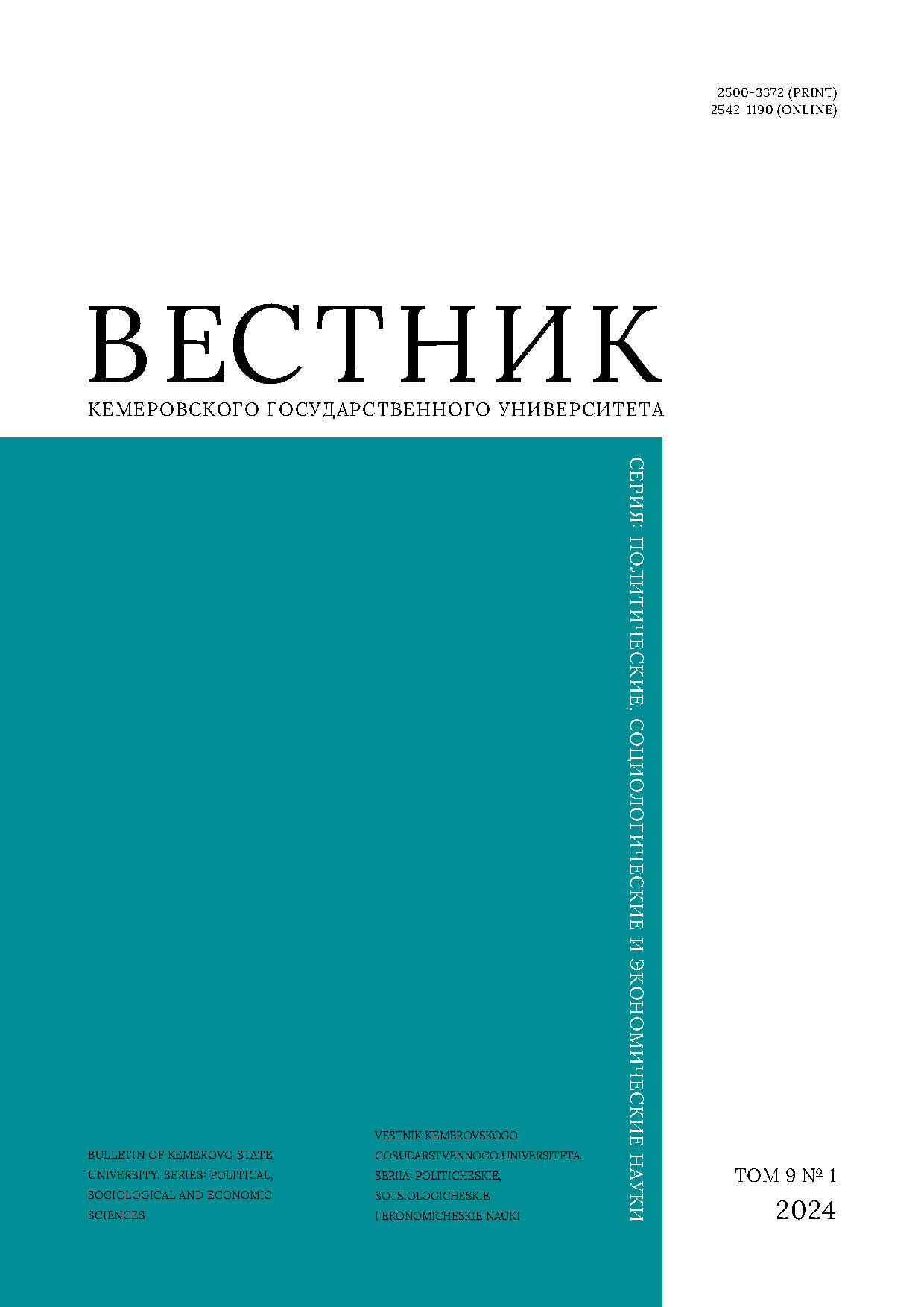Novosibirsk, Russian Federation
Novosibirsk, Russian Federation
Novosibirsk State University
Novosibirsk, Russian Federation
The article presents the main trends of the labor market in terms of the demand for a new type of IT specialists in the digital economy. The article forms a comprehensive understanding of the trends in the IT specialists’ labor market development in the context of the digital economy transformation and trends’ interaction with educational institutions through the acquisition of new professional competencies. To determine the relevance of the topic and identify key objectives, the authors performed a multidimensional bibliometric analysis of publication activity using six basic terms and their combinations. The article presents a statistical review of the IT personnel number in the world and Russia, the changes in the employment forms and the requirements for professional competencies in accordance with the Industry 4.0 paradigm, and confirms the hypothesis of insufficient flexibility and adaptability of the higher education system in terms of requests for a new type of IT specialists. The authors confirm the necessity for transforming the labor market and adapting to new realities on the part of both IT companies and specialists in the field. The study serves as a prerequisite for forecasting personnel needs and identifying structural changes in the digital skills of information and computer technology workers.
bibliometric analysis, digital economy, labor market, IT-specialists, Industry 4.0, professional competencies
1. Konovalova T. L. The Russian labor market in the context of digital transformation. Professionalnaia orientatsiia, 2019, (2): 15-20. (In Russ.) https://elibrary.ru/bbdprz
2. Shevyakova A. L., Petrenko E. S., Urazbekov A. K. Competences development for Industry 4.0: qualification requirements and solutions. Voprosy innovatsionnoy ekonomiki, 2020, 10(1): 85-102. (In Russ.) https://doi.org/10.18334/vinec.10.1.100690 EDN: https://elibrary.ru/RUJCNF
3. Larionova N. I., Yurieva O. V., Burganova L. A. The labor market in the context of digital transformation of the economy. The Review of Economy, the Law and Sociology, 2022, (4): 90-97. (In Russ.) https://www.elibrary.ru/toaiwp
4. Lokhtina T. N., Metelitsa V. I. Labor market and socio-economic problems of the Russian population. The Eurasian Scientific Journal, 2019, 11(1). (In Russ.) https://www.elibrary.ru/hxceot
5. Lychagin M. V., Lychagin A. M. Ecosystems in scientific literature on business and economics from the perspective of multidimensional bibliometric analysis. St. Petersburg State Polytechnical University Journal. Economics, 2021, 14(6): 7-28. (In Russ.) https://doi.org/10.18721/JE.14601 EDN: https://elibrary.ru/VKIPAG
6. Aksenova M. A. The labor market in the structure of tasks for the implementation of the National Project "Labor Productivity and Employment Support". Global transformation of Russia in the era of digitalization: problems, features, trends: XIII Intern. Sci.-Prac. Conf., Lipetsk, 17 Apr 2019. Yelets: Bunin Yelets State University, 2019, 69-74. (In Russ.) https://www.elibrary.ru/zasulr
7. Maksyutina E. V. New technologies and their impact on the labor market. Journal of Economy and Entrepreneurship, 2020, (3): 203-207. (In Russ.) https://doi.org/10.34925/EIP.2020.116.3.040 EDN: https://elibrary.ru/TAXTRV
8. Desyatko D. N., Rapgof V. B., Lushkin A. Iu. Technological changes and new trends of employment. Izvestiia Sankt-Peterburgskogo gosudarstvennogo ekonomicheskogo universiteta, 2020, (4): 17-23. (In Russ.) https://www.elibrary.ru/jkpfyl
9. Denisenko I. A., Kuzubov A. A., Shashlo N. V. The main trajectories of transformation of the labor market and labor resources in the context of digital and post-viral trends in the transformation of society. Pravo i upravlenie. XXI vek, 2021, 17(3): 52-61. (In Russ.) https://doi.org/10.24833/2073-8420-2021-3-60-52-61 EDN: https://elibrary.ru/MNBWDT
10. Gavrina E. G. Impact of the digital economy on the development of modern labor market. Scientific Research of Faculty of Economics. Electronic Journal, 2017, 9(4): 28-40. (In Russ.) https://doi.org/10.38050/2078-3809-2017-9-4-28-40 EDN: https://elibrary.ru/VMYVAU
11. Guzhina G. N., Ezhkova V. G. Transformation of the labor market under the influence of the digital economy. Innovations and Investments, 2019, (9): 56-59. (In Russ.) https://www.elibrary.ru/mkxqkx
12. Lishchuk E. N., Kapelyuk S. D., Chistyakova O. A. Labor market in the digitalization era. Efficiency of the sphere of commodity circulation and labor: Proc. VIII Pisarenkov readings, Gomel, 20 Oct 2022. Gomel: BTEU, 2022, 53-56. (In Russ.) https://www.elibrary.ru/bvrhit
13. Goloventchik G. G. Transformation of the labor market in the digital economy. Cifrovaja transformacija, 2018, (4): 27-43. (In Russ.) https://www.elibrary.ru/yxtojv
14. Tomashevski K. L. Digitalization and its impact on the labour market and employment relations (theoretical and comparative legal aspects). Vestnik of Saint Petersburg University. Law, 2020, 11(2): 398-423. (In Russ.) https://doi.org/10.21638/spbu14.2020.210 EDN: https://elibrary.ru/LZLKJW
15. Bögenhold D. From hybrid entepreneurs to entepreneurial billionaires. Observations on the socioeconomic heterogeneity of self-employment. American Behavioral Scientist, 2019, 63(2): 129-146. https://doi.org/10.1177/0002764218794231 EDN: https://elibrary.ru/RRGIZX
16. Lee N., Clarke S. Do low-skilled workers gain from high-tech employment growth? High-technology multipliers, employment and wages in Britain. Research Policy, 2019, 48(9). https://doi.org/10.1016/j.respol.2019.05.012
17. López-Igual P., Rodríguez-Modroño P. Who is teleworking and where from? Exploring the main determinants of telework in Europe. Sustainability, 2020, 12: 1-15. https://doi.org/10.3390/su12218797
18. Watermeyer R., Crick T., Knight C., Goodall J. COVID-19 and digital disruption in UK universities: afflictions and affordances of emergency online migration. Higher Education, 2021, 81(3): 623-641. https://doi.org/10.1007/s10734-020-00561-y EDN: https://elibrary.ru/JGSORA
19. Pryazhennikov M. O. Project employment in the labor legislation of Russia and the countries of North-East Asia (People’s Republic of China, Japan, Republic of Korea). Russian Journal of Labour & Law, 2021, (11): 277-287. (In Russ.) https://elibrary.ru/eqptua
20. Kroitor S. New business models and non-standard forms of employment in conditions of digital transformation: sociologist’s perspective. Society and Economics, 2019, (3): 136-154. (In Russ.) https://doi.org/10.31857/S020736760004295-3 EDN: https://elibrary.ru/VXCAIU
21. Orekhova I. M. Alternate forms of employment as a way of adaptation to economic changes in the Russian labour market. Theory and Practice of Social Development, 2015, (24): 108-112. (In Russ.) https://elibrary.ru/vcojqr
22. Klimenko O. I., Bezuglova Yu. V., Igolkina T. N. Labor market in the trend of digital transformation. Vestnik Belgorodskogo universiteta kooperatsii, ekonomiki i prava, 2023, (1): 90-99. (In Russ.) https://doi.org/10.21295/2223-5639-2023-1-90-99 EDN: https://elibrary.ru/XJYACE
23. Avis J. Socio-technical imaginary of the fourth industrial revolution and its implications for vocational education and training: a literature review. Journal of Vocational Education & Training, 2018, 70(3): 337-363. https://doi.org/10.1080/13636820.2018.1498907
24. Koloskova N. V., Chistyakova O. A. Financial market transformation and demand for a new type of specialists. Finance and Credit, 2020, 26(1): 2290-2309. (In Russ.) https://doi.org/10.24891/fc.26.10.2290 EDN: https://elibrary.ru/ONYZHD

















